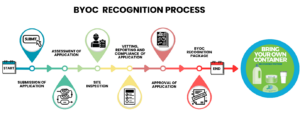Frequently Asked Questions (FAQs) about Bring Your Own Container (BYOC) Initiative for Economic Operators
-
What are the minimum eligibility requirements to be granted the BYCO recognized partnership? ▼
Any business entity operating in the Catering Undertaking and/or Retail sector, whether presently implementing or considering the introduction of a BYOC (Bring Your Own Container) initiative within their operational framework. Under the BYOC program, registered economic operators are encouraged to accept reusable containers from customers in exchange for a financial incentive at the time of purchase. A non-exhaustive list of potential financial incentives as outlined:
- Discounts.
- Loyalty programs.
- Additional content.
- Etc.
By following these guidelines, operators play a pivotal role in reshaping consumer habits and actively contribute to circular economy transition
-
How can I register for the BYOC initiative? ▼
To register for the BYOC initiative, economic operators should access the BYOC registration page at CE Malta’s website, access the online registration form, fill in the blanks and submit the form.
Should you have any doubts while filling in the form, you may contact CEMalta by telephone at +356 2226 8220 and via email on byoc@cemalta.gov.mt.
-
What happens after the registration submission? ▼
After the submission of the registration a thorough evaluation process will start according to the BYOC recognition process below:

-
If my operation does not abide by the minimum requirements, what happens? ▼
CEMalta officials will transparently communicate your recognition refusal while providing you suggestions and guidance on how to become a recognised partner. Following your request, if you wish to seek the BYOC recognition and implement the recommendations provided, CEMalta officials will review your application and communicate the outcomes effectively
-
What happens when I am granted the BYOC recognition mark? ▼
If you’re granted the BYOC recognition mark, participating operators receive recognition through branded material and a distinctive BYOC logo, signifying their commitment to reducing single-use waste and embracing sustainable practices, besides the online mapping display on the BYOC page at CE Malta’s website.
-
Are there any legal or regulatory considerations that economic operators need to address in BYOC programs? ▼
Economic operators should be aware of relevant laws, regulations, and industry standards related to food safety, packaging, labelling, and waste management when implementing BYOC programs. Compliance with regulations ensures consumer protection and mitigates legal risks. Kindly refer to the Guidelines and Terms & Conditions.
-
Can I refuse customers’ reusable containers? ▼
Yes, you can refuse consumers’ reusable containers. You should always prioritize food safety and hygiene standards. According to the BYOC guidelines, you must not accept containers with cracks, chips, stains, strong odours, warping, misshaping, corrosion, non-food-grade materials, visible mold, or mildew. If a container poses any physical contamination risk or is unsuitable for reuse, you can kindly decline to accept it to maintain food safety standards and
protect your customers’ well-being. -
Are there considerations on the size of containers? ▼
Containers should have a suitable size for the intended product to avoid spillage or overfilling. Large containers may require staff approval to ensure they can be safely accommodated.
If a container appears too small, you may explain to the customer that you will be serving them a smaller portion due to the container’s size. If the customer agrees, you proceed to accept the container and adjust the pricing according to the standard serving pricing.
To ensure transparency, it is recommended to display standard serving size measurements on your menus or at the point-of-sale, enabling customers to make informed choices about their container size and portion expectations.
-
What is a reusable container? ▼
A reusable container is a type of container designed and intended for multiple uses over an extended period rather than for single or limited use. These containers are typically constructed from durable materials such as plastic, glass, metal, or other materials that can withstand repeated use and cleaning without significant deterioration.
-
What conditions are expected from a consumers’ reusable containers? ▼
Suitable containers should be clean, leak-proof, and made from materials such as, but not limited to, stainless steel, glass, plastic, and durable silicone or ceramic. Tight-sealing lids are recommended, but not limited to, food, beverages, paints, self-care and cleaning products

